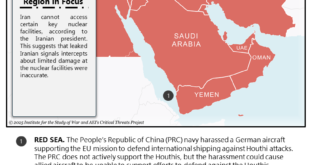Everyone from Hezbollah chief Hassan Nasrallah to President Trump seems to agree that storing 2,700 tons of ammonium nitrate in the middle of a civilian city was a really bad idea. The explosion of that material last week and the horrific damage and hundreds of deaths caused by the explosion leave no room for doubt on that score.
Hezbollah has used ammonium nitrate for terrorist attacks around the world and has been caught storing it several times in Western Europe. But whether Hezbollah was responsible for the Beirut disaster is still a matter of debate for some. Yet as the most powerful political force in the country at the moment of the disaster, it’s hard to believe that the organization does not bear blame. It makes little difference whether Hezbollah’s was a sin of commission (because it actually put the stuff there and kept it there) or of omission (because, as the entity in de facto control of the country, it failed to take the necessary steps to protect the Beirut population).
Wherever you come out on that question, there’s no way to avoid the fact that Hezbollah is directly responsible for exactly the same horrific choice, which it has made throughout the once prosperous, now failed country of Lebanon: placing 150,000 missiles, and the launchers needed to fire them, in houses, schools, mosques, and other storage facilities in the middle of Lebanese towns and villages. All of them are pointed at Israel.
Those weapons are there for only one reason: so they can be hurled at the Jewish state’s cities and towns, filled with Israeli citizens. There’s only one way for Israel to protect itself from this obscene threat: by blowing up those missiles before they’re launched. Israel knows where they are but has refrained thus far from attacking them. But when Hezbollah starts firing them, Israel will have no choice.
The result will dwarf the destruction in Beirut. The weapons to be destroyed are not a widely used fertilizer that is also combustible but ordnance designed to explode and destroy. When they are destroyed, they will explode. When that happens, they will, in all likelihood, vaporize the little towns and villages in which they are being kept in readiness for attacks on the Jewish state, along with anyone nearby. Not hundreds, but thousands will die.
So explained a report issued by three retired flag rank American generals and two former U.S. Army lawyers in 2018. The report notes that Hezbollah’s arsenal is more powerful than 95% of the world’s official militaries. Even this staggering weapons collection, by an entity that pretends it is not a de facto state, gives Hezbollah no actual chance to defeat Israel militarily. But it will force Israel to destroy these missiles as quickly as possible once Hezbollah starts launching them.
Hezbollah has placed the weapons in civilian sites precisely to cause Lebanese civilian casualties, which it hopes to blame on the Israelis. Just as the massive storage depot of explosive material was in the middle of Beirut, the American commanders’ report explains that Hezbollah has “deliberately” stored its weapons in homes, schools, and mosques throughout Lebanon. The report explains that Hezbollah, designated as a terrorist organization by the United States, Germany, and numerous other countries, has made this choice specifically in order to “force innocent civilians into harm’s way in order to direct the blame for ensuing casualties and damage onto Israel.”
This kind of conduct perhaps explains the striking fact that the United Nations secretary-general, not normally viewed as a passionate advocate of Israeli interests, recently called upon Lebanon to “disarm” Hezbollah. Of course, as a practical matter, Hezbollah effectively controls the Lebanese government — at least it has up to the Beirut cataclysm. So asking the Lebanese government to disarm Hezbollah was essentially asking Hezbollah to disarm itself — not likely to get very far, given what has been the allocation of power in what remains of that country.
Demonstrations on Saturday at which Nasrallah was hanged in effigy (along with Michel Aoun, the country’s prime minister), suggest that the Lebanese people may finally have had enough of Hezbollah and are prepared to force the creation of a government whose overarching goal is the rebuilding of Lebanon rather than the destruction of the country next door. Indeed, that public pressure led on Monday to the resignation of the entire government.
It’s far from clear what will happen next, or whether the anticipated disorder will help or hurt Hezbollah. In one surprising development, Deutsche Welle reports that 55,000 Lebanese people have signed a petition asking France to come back and take control for ten years. That plea shows how far some Lebanese think they need to go for help: The League of Nations French Mandate over Lebanon and Syria ended in 1943.
But even if there is no change in Lebanon’s power structure now, perhaps the U.N.’s recently found awareness that Hezbollah’s arsenal is a danger to the region’s stability might spread among the world’s governments.
Some Western countries still pretend that Hezbollah has “social welfare” goals that are somehow separate from its Iran-financed program to destroy Israel. Not only such human rights stalwarts as China, Syria, and Venezuela think so: The European Union still distinguishes between Hezbollah’s “military” wing and its political activities and designates only the former as terrorists, while the latter is understood not to be. (This position seems to be driven by France — maybe that explains some of the signatures on that petition.)
The world has long been notoriously indifferent to announced efforts, on the part of Iran, Hamas, Hezbollah, and others, to eliminate the world’s one Jewish nation. Perhaps out of the ashes of Beirut, more people will come to realize that Lebanon is the country now being destroyed by Hezbollah. Maybe that will be enough to persuade them that Hezbollah, all of it, really is a terrorist organization. Not many of the world’s governments want to do very much to save the Jews or the Jewish state. Perhaps the Beirut disaster will convince them to try to save the Jews’ next-door neighbors.
 Eurasia Press & News
Eurasia Press & News


